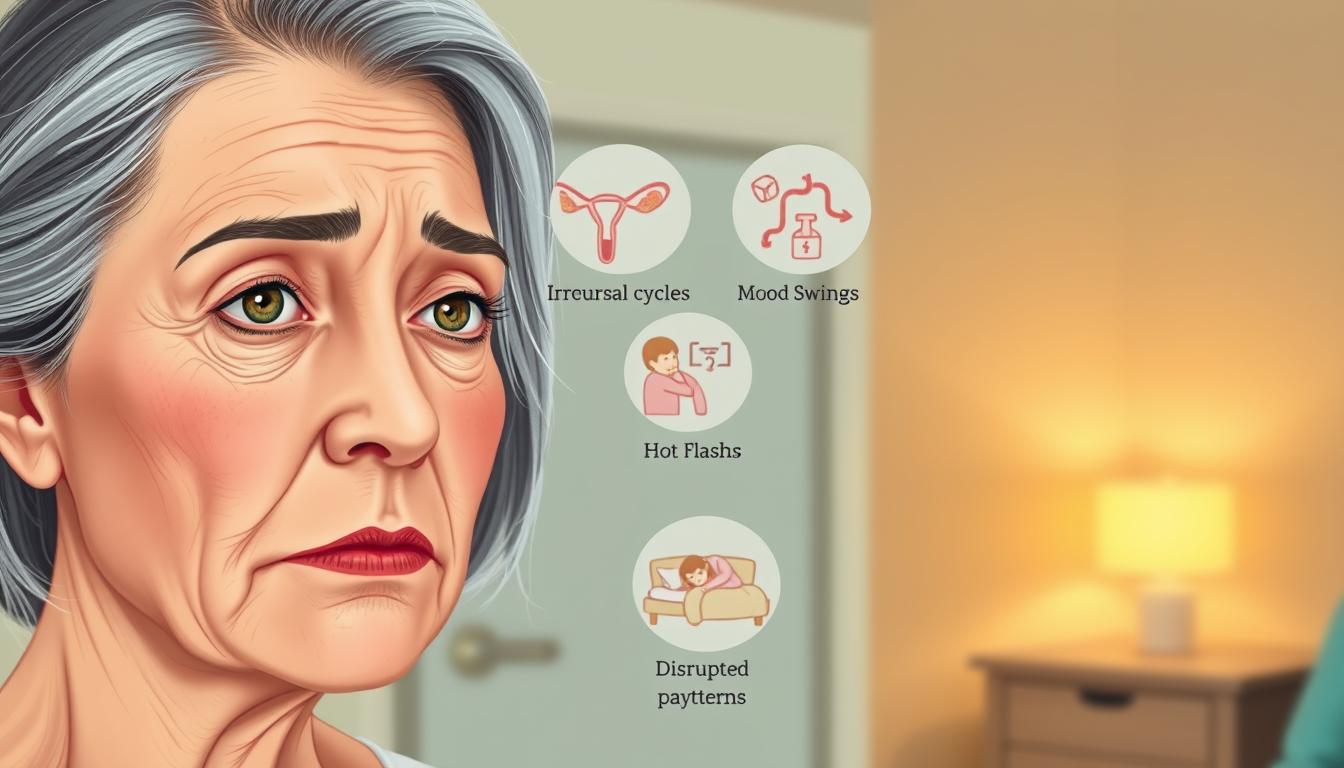Perimenopause Symptoms: 34 Signs You’re in Perimenopause

As you get closer to menopause, your body goes through big changes. This is called perimenopause. It’s when your hormones change a lot, leading to physical and emotional changes. Knowing the signs of perimenopause is key to handling this change well.
You might feel a lot of symptoms that can be scary. But knowing what to look for can really help. You might see changes like irregular periods or mood swings. These signs can be different for every woman.
Spotting these changes is the first step to taking care of yourself. By knowing the perimenopause symptoms, you can get through this phase better. And you’ll be ready for what comes next in your life.
Key Takeaways
- Perimenopause is a transitional phase leading to menopause.
- Hormonal changes cause various physical and emotional symptoms.
- Understanding these signs is crucial for effective management.
- Symptoms can vary widely among women.
- Recognizing these changes helps in taking control of your health.
Introduction to Perimenopause
Perimenopause is a complex journey with varied symptoms. It affects women differently. Knowing what perimenopause is helps manage its effects on your life.
What is Perimenopause?
Perimenopause is the time before menopause. Hormonal changes cause many symptoms. These can start as early as your mid-40s.
Average Age and Duration
It starts in your mid-40s and lasts 4 to 10 years. The time and when it starts can vary. This depends on genetics and health.
If you’re between late 30s and early 50s, you might be in the perimenopause age range. Knowing the perimenopause stages helps prepare for symptoms.
Why Symptoms Vary Widely
Symptoms change because of hormone levels. You might feel some or all symptoms, from mild to severe.
Knowing the symptoms and their changes helps manage perimenopause. It’s a time needing patience, understanding, and sometimes, medical help.
Physical Symptoms of Perimenopause
Perimenopause symptoms can be tough to handle. But knowing what they are is the first step to feeling better. You might notice many physical changes that affect your daily life.
Irregular Periods
Irregular periods are often the first sign of perimenopause. You might see changes in how often, how long, and how heavy your periods are. Some common changes include:
- Shorter cycles: Your periods may come closer together.
- Longer cycles: You might have longer gaps between periods.
- Heavier or lighter flow: Your bleeding can be more or less intense.
These changes can be hard to predict and may cause discomfort or worry.

Hot Flashes and Night Sweats
Hot flashes and night sweats are common symptoms of perimenopause. Hot flashes are sudden feelings of heat, often with sweating and flushing. Night sweats are hot flashes that happen while you’re sleeping. These can be triggered by stress, certain foods, or hormonal changes.
Weight Gain Patterns
Many women gain weight during perimenopause, often around the midsection. This can be due to hormonal changes, aging, or lifestyle factors. Managing weight gain through a balanced diet and regular exercise can help.
Breast Tenderness
Breast tenderness is another symptom of perimenopause. Hormonal changes can cause breast swelling and sensitivity. Wearing a supportive bra and practicing relaxation techniques may help reduce discomfort.
By understanding these symptoms, you can start managing them. Making lifestyle changes, like dietary modifications and stress management, can also help alleviate symptoms.
Emotional and Mental Symptoms
Perimenopause can bring emotional and mental symptoms that are hard to handle. These symptoms come from hormonal changes, like estrogen level drops. These changes can mess with brain chemicals.

Mood Swings
Mood swings are common in perimenopause. You might feel irritable or anxious for no reason. Or, you could go from calm to overwhelmed quickly. These mood swings come from perimenopause hormone imbalance and brain chemistry changes.
To deal with mood swings, try stress-reducing activities like meditation or deep breathing. Exercise regularly to help keep your mood stable.
Anxiety Increase
Anxiety often goes up during perimenopause. You might feel worried, restless, or scared a lot. Hormonal changes make anxiety worse, so finding ways to cope is key.
Do things you love and that relax you. Also, natural remedies for perimenopause like black cohosh might help. But talk to a doctor before trying new supplements.
Depression Risk
Depression risk goes up in perimenopause because of big hormonal changes. Knowing depression signs like sadness, losing interest in things, or appetite changes is important. If you see these signs, get help from a mental health expert.
Changing your lifestyle can help. Eat well, exercise, and sleep enough. These steps support your mental health.
Brain Fog
Brain fog is common, making it hard to focus, remember things, or feel confused. Hormonal changes might cause it. To fight brain fog, stay organized, sleep well, and do things that challenge your mind.
Some women find natural remedies for perimenopause like ginkgo biloba help with thinking. But always talk to a doctor before trying new supplements.
Sleep and Energy Symptoms
Perimenopause can change how you sleep and feel energetic. These changes can affect your daily life. It’s important to know how to handle them.
Insomnia Patterns
Insomnia is common in perimenopause. It makes it hard to fall or stay asleep. You might lie awake at night, unable to relax.
To fight insomnia, try a bedtime routine. Make your bedroom sleep-friendly. Avoid caffeine and screens before bed.
Fatigue Types
Fatigue in perimenopause can feel different. You might always feel tired or lack energy. This can make everyday tasks hard.
Knowing your fatigue helps find solutions. You might need to change your lifestyle or try perimenopause treatment options.
Energy Crashes
Energy crashes happen suddenly. They can make it hard to do daily tasks. These crashes are unexpected and can be very tough.
To handle energy crashes, find what triggers them. Take breaks, exercise, and eat well. These steps can help.
Sleep Quality Changes
Sleep quality often changes in perimenopause. You might sleep less deeply or wake up a lot. This can be tough.
To improve sleep, try relaxation exercises and sleep stage management. A comfy sleep space also helps. Better sleep can help manage symptoms and improve your life.

Understanding and tackling sleep and energy issues can greatly improve your life. It’s a big step in managing perimenopause symptoms.
Sexual and Urinary Symptoms
Menopause brings big changes, including in sex and urine health. Knowing what’s happening is key to feeling better. You might face symptoms that change how you feel about sex and comfort.
Vaginal Dryness
Vaginal dryness is common in perimenopause. It makes sex uncomfortable. This is because estrogen levels drop. Using lubricants and moisturizers can help make sex more comfortable.
Talk to your doctor about estrogen therapy or other treatments for vaginal dryness.
Libido Changes
Libido changes are a sign of perimenopause. Hormonal shifts can lower your sex drive. Vaginal dryness can also affect intimacy. Talking openly with your partner can help you both adjust.

UTI Frequency
UTIs can happen more often in perimenopause. Hormonal changes and sex can play a role. Good hygiene, staying hydrated, and urinating after sex can help prevent UTIs.
Incontinence Issues
Incontinence can also occur in perimenopause. It’s often due to weak pelvic muscles. Doing Kegel exercises can strengthen these muscles. Avoiding caffeine and alcohol can also help.
Understanding these symptoms and looking for relief can improve your life. By knowing what’s happening and seeking help, you can manage your symptoms better.
When to See a Doctor
As you go through perimenopause, knowing when to see a doctor is key. Some symptoms can be handled at home. But others might mean you need a doctor’s help.
Red Flag Symptoms
Some symptoms in perimenopause are serious and need quick doctor visits. These include:
- Heavy or prolonged bleeding: If your periods are very heavy or last too long.
- Severe pain: Sudden or bad pain in your belly or pelvis.
- Depression or anxiety: Feeling really down or anxious that stops you from living your life.
Testing Options
Your doctor might suggest tests to understand your symptoms. These can be:
- Hormone level tests to see if your hormones are out of balance.
- Blood tests to check for other health issues.
- Ultrasound to look at your uterus and ovaries.
Treatment Overview
Treatment for perimenopause symptoms depends on how bad they are. You might get:
- Hormone Replacement Therapy (HRT) to help with hot flashes.
- Lifestyle changes like better diet and exercise.
- Non-hormonal medications for anxiety or depression.
Questions to Ask
Having questions ready can make your doctor’s visit better. Ask things like:
- What treatments work best for my symptoms?
- Are there lifestyle changes that can help my symptoms?
- How will we keep track of my symptoms and change treatment if needed?

Natural Management Strategies
You can ease perimenopause symptoms by making simple changes. Try diet changes, regular exercise, stress management, and supplements. These natural methods can help you feel better and improve your health.
Diet and Nutrition
Eating foods high in omega-3s, calcium, and vitamin D can help. Salmon, spinach, and fortified dairy are great choices. They can really help with your symptoms.
Exercise and Stress Management
Exercise like yoga or brisk walking can lessen hot flashes and anxiety. Stress-reducing activities, like meditation and deep breathing, can also help with mood swings.
Supplement Options
Supplements like black cohosh and probiotics might offer extra relief. But, always talk to your doctor before starting any supplements. This ensures they’re safe for you.
